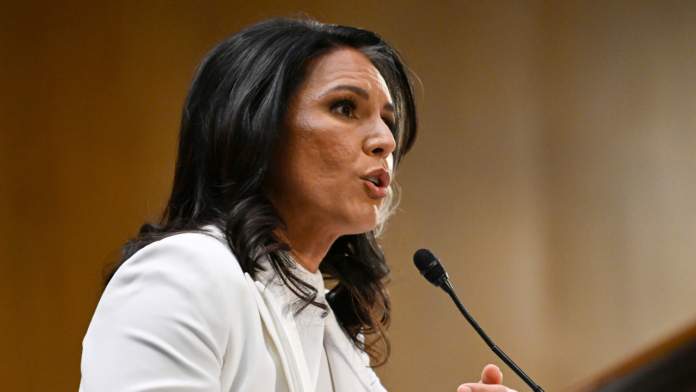Former Democratic congresswoman and military veteran Tulsi Gabbard has officially assumed one of the most important positions in the U.S. government: that of Director of National Intelligence (DNI). Confirmed by the Senate on Feb. 12, 2025, Gabbard’s appointment reflects a major change in the top ranks of the nation’s intelligence community. But her confirmation was not without controversy, with lawmakers and the public questioning her past positions on Russia, Syria, and government surveillance. Here’s a closer look at Gabbard’s ascent to DNI and what her leadership means for the U.S. in 2025.
A Controversial Confirmation
Gabbard’s path to confirmation was anything but smooth. Despite her military creds and experience as a congresswoman, her record drew fire from many quarters. Both Republicans and Democrats raised questions about her past and whether she was the right choice for the job, from a controversial visit with Syria’s President Bashar al-Assad in 2017 to what they portrayed as a soft touch on Russia and support for Edward Snowden, the whistleblower who shared top secret government information about American spying programs.
But after weeks of behind-the-scenes pressure and closed-door sessions, Gabbard was able to round up enough support among Republicans to move the Senate. The final vote was 52 to 48, with just one Republican, Senator Mitch McConnell, voting against her nomination. McConnell raised concerns about her “history of alarming lapses in judgment,” but other Republicans — including Senators Susan Collins and Lisa Murkowski — eventually supported her, pointing to her commitment to reforming the intelligence community.
Also read: Lawmaker Slams Trump for Riot Abandonment Over Capitol Pardons
Gabbard’s View of the Intelligence Community
As DNI, Gabbard would be in charge of 18 intel agencies including the CIA and NSA. Her most important job is keeping the American people safe and secure by delivering honest, objective intelligence to the president and other decision-makers. As she was sworn in, Gabbard pledged to work on restoring confidence in the intelligence community, which she has argued has been undermined through years of politicization and weaponization.
Gabbard described four priorities for her time in office:
- Analyzing Global Threats: A new perspective on intelligence and data coordination between agencies
- Decoupling Intelligence: Ending politicization by ensuring that intelligence is collected and analyzed free from political bias.
- Building Trust: Improving transparency and accountability in the intelligence community.
On the other hand, working on best practices can provide benefits like:
A Shift on Surveillance
Perhaps most striking: was Gabbard’s new attitude toward government surveillance. Previously, she had been an outspoken critic of programs such as Section 702 of the Foreign Intelligence Surveillance Act (FISA), which permits the government to collect communications of suspected terrorists abroad. She even sponsored a bill to repeal Section 702 while in Congress.
But during her confirmation hearings, Gabbard expressed support for Section 702, noting reforms that have alleviated her concerns about civil liberties from earlier years. She now sees the program as an essential national security tool as long as it is employed judiciously.
Also read: JoAnn Fabrics Closing 500 Stores: What’s Happening?
Strengthening U.S.-India Ties
The confirmation has also been embraced by India, an important U.S. ally. Just weeks after her confirmation, she welcomed Indian Prime Minister Narendra Modi to Washington, D.C. During a meeting, the two leaders also exchanged views on enhancing bilateral intelligence cooperation, including in such areas as counter-terrorism, cybersecurity, and strategic intelligence cooperation.
Gabbard’s connection to India — her Hindu faith, her mother’s conversion to the sect known as Gaudiya Vaishnavism — has long embraced her affinity for the country. In the past, Modi has lauded her as a “strong votary of India-U. S. friendship” and their meeting further enhanced the relationship in February 2025.
Challenges Ahead
Even if she is confirmed, Gabbard will have an uphill fight. Her absence of formal intelligence experience has led to concerns about whether she can run such a sprawling and vital organization. Moreover, other wobbles, over Russia and Syria, still dog her credibility, and these countries’ stock remains high.
There will also be the line Gabbard will have to draw between protecting national security and civil liberties. Her anti-surveillance background, which was toned down during her confirmation, still leaves open the question of how she will address sensitive aspects of intelligence programs.
Election and the Beginning of a New Era for U.S. Intelligence
It is a new chapter for the U.S. intelligence community with Tulsi Gabbard as DNI. Her military background, her commitment to reform, and her relationships with important allies like India will make her a unique and potentially transformative leader.








